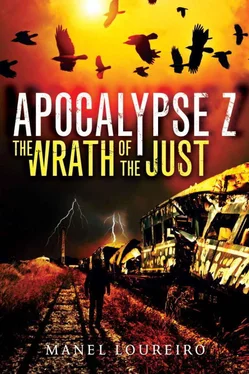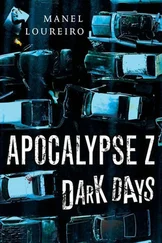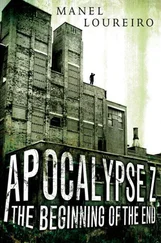I’d failed. I’d failed everyone. I couldn’t save myself or save them. I’d failed Lucullus, who struggled inside the saddlebag trying to escape. I’d failed Prit, who’d always been a faithful, true friend, even risking his life for me.
And Lucia. Lucia. Luuucíaaa. Luuucccíaaaa. Lcxciciiaia. Lucciihayayaa.
A huge black wave crashed over me. Then everything went dark.
TAUBEN
12 MILES OUTSIDE OF GULFPORT

“Virgin of Kazan! That’s a horrible smell!” Prit groaned and covered his nose.
“You think that’s bad,” Mendoza replied cheerfully, “wait’ll we get to the dump. It’s about a mile from here, past that hill. Now that’s a truly unbearable stench.”
Gulfport dumped most of its trash into the ocean. Toxic waste and pollutants were thrown into a landfill a few miles from the city. That included the bodies of helots and the Undead that collapsed close to the Wall, overcome by fungus. No one wanted hundreds of putrefying corpses lying around causing an epidemic.
The convoy rolled slowly down a rough road that wound through abandoned buildings. One tank led the way and another one brought up the rear. Garbage trucks and a bulldozer—their cabs reinforced by iron bars—made up the rest of the convoy.
They left the city at dusk through the gates in the Wall. The bulldozer slowly pushed aside the crowd of Undead that surrounded the city, trying to find a way in. Then the convoy moved as fast as possible to outrun the Undead pursuing them. It was not difficult to leave the Undead behind. Previous expeditions had cleared the road of debris, and the creatures were in bad condition. Even those that were “fresher” couldn’t keep up with the speeding vehicles.
When the helots first told Pritchenko that the Undead were being devoured by fungus, he hadn’t bought it. Then the Ukrainian saw it with his own eyes. It boded well for the future. But first they had to gain control of Gulfport and the Cladoxpan reserves—or all the helots were doomed to suffer the next stage of Greene’s plan.
“You sure we’re carrying the cargo?” he asked Mendoza for the third time.
“Don’t know, güero ,” snapped the Mexican. “And I won’t know till we unload all the piles of garbage and bodies. But I’m sure of one thing. The Just have never failed us, and I don’t think they’ll start now.”
Prit nodded and checked his weapon. Everyone in the convoy was wound tight. The assault on the city was planned for the next night. Everything was riding on the next twenty-four hours—the helots and their allies were nervous. Their plans had never progressed this far. Even Greene’s snitches were in the dark. The reverend knew something was brewing in the ghetto, but he didn’t know what it was or when it would take place. The missing piece of the puzzle was the Cladoxpan supply that they hoped was hidden in those trucks. As soon as they had their hands on it, the Wrath of the Just could be unleashed on that racist city.
The convoy labored up the hill and came to a halt at the top. At the bottom of a ravine was a mountain of charred debris being slowly consumed by a bonfire that had burned for months. A dozen Undead wandered here and there in the lunar landscape. The tank in the lead revved its engine and advanced through the fires. A pair of sharpshooters leaned out the hatch. They raced up to an Undead, opened fire, and moved on. Before Pit realized it, they’d secured the entire area.
“There aren’t very many of them anymore, so it’s easy,” said the driver of the truck Prit rode in, a middle-aged man with an Indian accent. “Not that long ago, it took us several hours—and a lot of ammo—to get close enough to unload safely.”
“Apu knows what he’s talking about. He’s one of the oldest residents of the ghetto. He’s been making this trip for nearly two years,” said Mendoza.
The man flashed a dazzlingly white smile and shrugged modestly. He raised his arm, revealing the scar of an old wound. “It happened about a year and a half ago. There were about two hundred of those creatures out there. One of them found a way inside the cab. But we got through, as always.”
Prit studied him. People amazed him. Despite all the hardships, despite living a miserable, enslaved life, they still had the will to live.
“Is your name really Apu, like the convenience store owner on The Simpsons?” he asked with a sly smile.
“It’s a long story,” the man replied with a wave of his hand. “My real name has too many letters for anyone who wasn’t born in Sri Lanka.”
“I can imagine,” Prit said, turning to Mendoza. “Now what?”
“Now, we take out the trash, bro,” he replied, as Apu maneuvered the truck into position. “Time to get our hands dirty.”
They positioned the dump trucks around a pit and started unloading their stinking cargo. Prit watched as arms, legs, and heads disappeared into the roaring bonfire along with medical waste and rotting garbage. The smell of burning flesh and hair filled the air.
“Hey! Be careful!” Mendoza shouted, waving his arms.
A few helots scrambled to the top of the trucks, ignoring the terrible smell. Armed with flashlights, they made their way to the back of the truck bed. After a while they came back out, flashing a thumbs-up.
“They’re in the back, tied down with steel cables! A dozen barrels in each truck!” they shouted above the noise of the engines as they dragged one out.
“Perfect,” murmured Mendoza. He opened the lid of a barrel with the tip of his knife. “Let’s have a look.”
When he uncovered the barrel, Cladoxpan’s pungent aroma wafted into the air. The men smiled and walked closer to the barrel. A few were glassy-eyed and couldn’t look away from the milky liquid.
“Gato…” The Hindu truck driver clucked his tongue and swallowed hard. His hands shook like an alcoholic’s. “One sip. I think we’ve earned it.”
The Mexican scowled, then nodded slightly. “One glass each. Not a drop more.”
The helots cheered and gathered around the barrel. Prit stepped aside. He noticed that the men downed their glasses in great greedy gulps. The women sipped theirs. A few even saved some for later.
The Ukrainian smiled. He was sure his pal would’ve made some funny remark about that, and they’d have struggled not to burst out laughing. They’d have stood off to the side, pursing their lips, with tears in their eyes, choking back their laughter.
When he thought about his friend, he felt a deep pain. He hadn’t accepted losing him. It would take a long time to come to terms with it. The Ukrainian was a hard man. He’d lost a lot of friends in Chechnya during the war. Then his wife and son had disappeared in the pandemic. He’d grown thick-skinned and hid his feelings. But feelings didn’t go away. Prit knew they’d surface sooner or later. When they did, the pain would be huge and hard to deal with. For now he held it in and kept going. For Lucia’s sake.
She was devastated. At first she’d had high hopes. Their wily friend was a man of many talents. They tried to convince themselves that his train car had unloaded close to town and that he’d find his way back to Gulfport. No deportee had ever done it, but if anyone could make it back, he could.
But it had been seven days and there was no sign of him. Even if he was still alive, he must have run out of Cladoxpan. When Strangärd told them the terrible news—that Greene had infected their friend with the virus as part of his banishment—they lost hope.
Читать дальше













